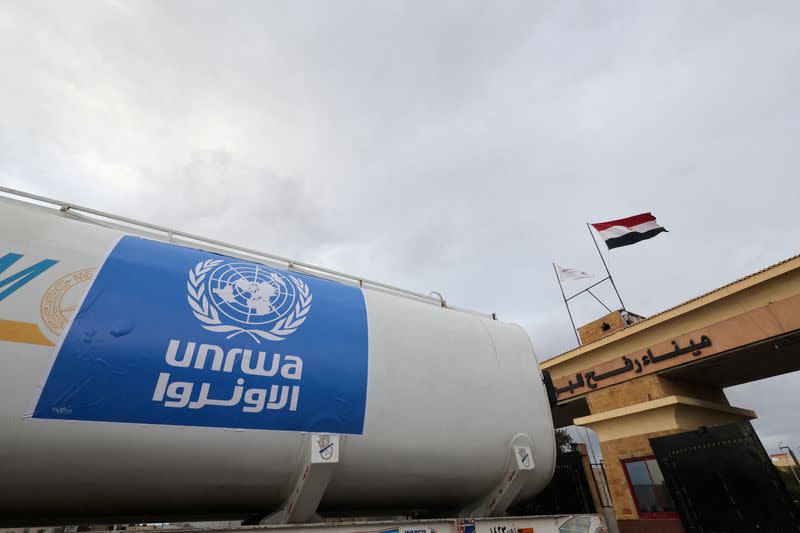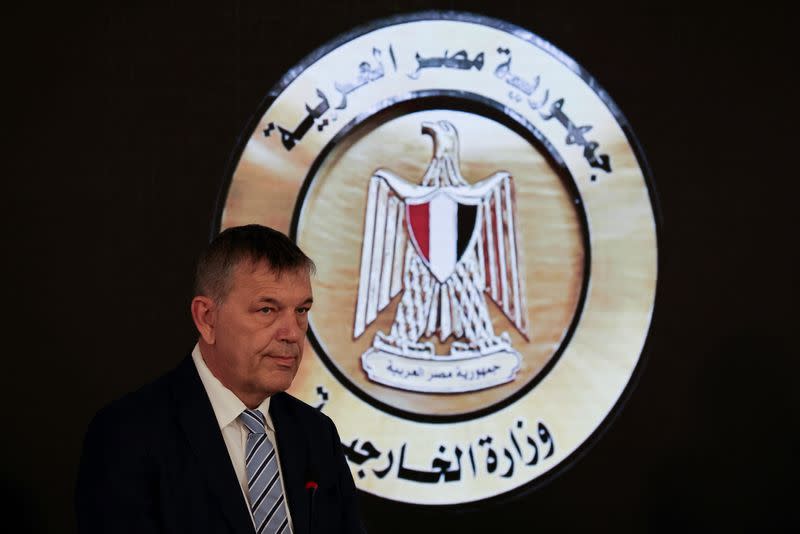Israel yet to show evidence UNRWA staff are members of terrorist groups, review finds
By Michelle Nichols and Tom Perry
UNITED NATIONS/BEIRUT (Reuters) - Israel has yet to provide evidence for its accusations that hundreds of staff with the U.N. agency for Palestinian refugees (UNRWA) are members of terrorist groups, according to a review of the agency's neutrality released on Monday that could prompt some donor countries to review funding freezes.
The United Nations appointed former French foreign minister Catherine Colonna to lead the UNRWA review of UNRWA's ability to ensure neutrality and respond to allegations of breaches in February after Israel accused 12 UNRWA staff took part in the Hamas-led Oct. 7 attacks which triggered the Gaza war.
A separate investigation by internal U.N. investigators is looking into the Israeli allegations against the 12 UNRWA staff. The U.N. said last week that the U.N. Office of Internal Oversight Services (OIOS) has had "a number of meetings and cooperation from the Israeli authorities on this.”
UNRWA provides education, health and aid to millions of Palestinians in Gaza, the West Bank, Jordan, Lebanon and Syria. The review said UNRWA shares staff lists annually with the Palestinian Authority, Israel, Jordan, Lebanon, and Syria.
The review said Israel had not raised any concerns with UNRWA, based on those staff lists, since 2011. Then in March 2024, "Israel made public claims that a significant number of UNRWA employees are members of terrorist organizations."
"However, Israel has yet to provide supporting evidence of this," the review said.
Israel stepped up its accusations in March, saying over 450 UNRWA staff were military operatives in Gaza terrorist groups. UNRWA employs 32,000 people across its area of operations, 13,000 of them in Gaza.
On Monday, Israeli Foreign Ministry spokesperson Oren Marmorstein accused more than 2,135 UNRWA workers of being members of Hamas or Palestinian Islamic Jihad. He said the Colonna review of UNRWA was insufficient and an "effort to avoid the problem and not address it head on."
"The Colonna report ignores the severity of the problem, and offers cosmetic solutions that do not deal with the enormous scope of Hamas' infiltration of UNRWA," he said, adding that Israel calls on donors not to give money to UNRWA in Gaza and instead to fund other humanitarian organizations in the enclave.
'LIFELINE'
Colonna told reporters she had good relations with Israel during the review but was not surprised by the Israeli response. She said she had appealed to Israel to "please take it on board, whatever we recommend - if implemented - will bring good."
When asked about Marmorstein's comment, UNRWA communications director Juliette Touma said: "We encourage member states who have such information to share it with the ongoing investigation rather than with the media."
U.N. Secretary-General Antonio Guterres has accepted the recommendations, his spokesperson said, calling on all countries to actively support UNRWA as it is "a lifeline for Palestine refugees in the region."
Israel's allegations against the dozen UNRWA staff led 16 states to pause or suspend funding of $450 million to UNRWA, a blow to an agency grappling with the humanitarian crisis that has swept Gaza since Israel launched its offensive there.
UNRWA said 10 of those countries had resumed funding, but the United States, Britain, Italy, the Netherlands, Austria and Lithuania had not. A U.N. spokesperson said UNRWA currently had enough funding to pay for operations until June.
Following the Israeli allegations against UNRWA staff, the United States, UNRWA's biggest donor at $300-400 million a year, paused funding, then the U.S. Congress suspended contributions until at least March 2025.
'ROBUST FRAMEWORK'
Israel has long complained about the agency, founded in 1949 to care for Palestinian refugees. Israeli Prime Minister Benjamin Netanyahu has called for UNRWA to be shut down, saying it seeks to preserve the issue of Palestinian refugees.
Israel launched its assault in Gaza after Hamas fighters rampaged through Israeli towns on Oct. 7, killing 1,200 people and abducting another 253, according to Israeli tallies. Israel has killed more than 34,000 people in Gaza, according to Gaza health authorities.
UNRWA says it terminated the contracts of 10 of the 12 staff accused by Israel of involvement in the Oct. 7 attacks, and that the other two are dead.
The Colonna review noted that UNRWA has "a more developed approach" to neutrality than other similar U.N. or aid groups. "Despite this robust framework, neutrality-related issues persist," it found.
It said these included some staff publicly expressing political views, textbooks with problematic content being used in some UNRWA schools, and politicised staff unions making threats against UNRWA management and disrupting operations.
In Gaza, UNRWA's neutrality challenges included the size of the operation, with most personnel being locally recruited and also recipients of UNRWA services, the review said.
UNRWA head Philippe Lazzarini said on Monday that UNRWA was developing an action plan to take forward the recommendations by Colonna's review.
"The recommendations in this report will further strengthen our efforts and response during one of the most difficult moments in the history of the Palestinian people," he said.
The Palestinian Foreign Ministry said the recommendations "to enhance UNRWA's already high standards of impartiality, humanity and neutrality" were important and appealed to donors who paused funding to "urgently reconsider their decisions."
(Reporting by Tom Perry in Beirut and Michelle Nichols in New York; Additional reporting by Henriette Chacar in Jerusalem and Ali Sawafta in Ramallah; Editing by Angus MacSwan, Ros Russell and Howard Goller)



